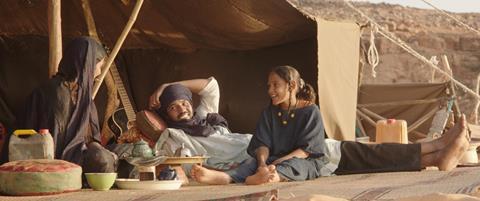Dir: Abderrahmane Sissako. France-Mauritania. 2014. 97mins

At a time when the entire world is shocked by the shocking acts of the Boko Haram cohorts in Nigeria, Abderrahmane Sissako’s film quietly, but forcefully, suggests that the new scourge of Africa seems to no longer be colonialism but the bloody terror inflicted on its innocent habitants by Muslim extremists all over the continent. Several times featuring in the Un Certain Regard section; having served in more than one Cannes jury and after shining in an out of competition slot with Bamako (2006), Sissako finally lands - and most deservedly - in the festival’s main competition with a film whose uncanny timeliness will not be lost on its audiences and might easily find itself with an award.
Sissako’s precise, economic, style looks almost monastic, but unsurprisingly obtains a far more powerful effect.
The screenplay is based on an incident that took place a couple of years ago in a small city in the north of Mali. In 2012, during the brief spell they ruled the region, Islamic Jihadists executed a couple for living together and bringing up their children, without having been properly married. Working out of this basic premise, the script draws a firm line between the simple, pious but reverential faith of the locals and the brutal, inhuman conduct of the invaders, who claim, though they are neither saintly nor really observant, to perpetrate their horrors in the name of God.
Brandishing guns, driving madly through the desert into peaceful villages and espousing the rules of Sharia, they tell their unsuspecting victims - who did not quite understand what was happening to them - that music is forbidden; walking in the streets means loitering; women with face, hands or feet uncovered are sinful and all transgressions of the law are punishable either by lashes administered in public places or by actual stoning, with the condemned buried up to their neck in the sand and the executioners flinging stones at them until they die.
Though the plot revolves around a couple, Kidane (Ibrahim Ahmed) and Satima (Toulou Kiki), who live peacefully on a dune outside town until a nearby fisherman kills one of their cows, Sissako draws a larger and more elaborate network of details, offering a composite picture of innocence trampled over by fundamentalist craze, which has less to do with religion or faith and much more with the thirst for unlimited power, using religion just as an excuse to crush any kind of insubordination.
Calm, controlled and confidently displaying his visual language, the backdrop of Sissako’s film paints on the one hand a powerfully well balanced picture of an almost animistic indigenous society – though officially their religion is Muslim – with glimpses of the Western world breaking in every once in a while, for instance in a lively argument about the respective qualities of soccer superstars Zinadine Zidane and Leo Messi.
On the other hand, the intruders who do not speak the language of the local tribes (communication difficulties are underlined all through) and are completely alien to their traditions and way of life, but empowered by the might of the rifles they hold in their hands, and the belief that they have the right to arbitrarily enforce their own rules and punish anyone who does not submit to them.
After all the orgiastic brutalities Hollywood indulges in to show the mean streak of the human race, Sissako’s precise, economic, style looks almost monastic, but unsurprisingly obtains a far more powerful effect, whether it is an amazing long shot ending the encounter between Kidane and the fisherman; the scene of a woman cruelly whipped for having dared to sing or a couple stoned to death for sharing the same room after dark. The casting works perfectly, both for the professionals (mostly playing jihadists), or amateurs, and the camerawork of Sofiane El Fani (who shot Blue Is The Warmest Colour) confirms she is a bright new force, equally gifted when handling intimate portraits or large landscapes.
Production companies: Les Films de Worso, Dune Vision
Producer: Sylvie Pialat
International sales: Le Pacte, www.lepacte.com
Screenplay: Abderrahmane Sissako, Kessen Tall
Cinematography: Sofiane El Fani
Editor: Nadia Ben Rachid
Production designer: Sebastien Birchler
Music: Amine Bouhafa
Main cast: Ibrahim Ahmed (aka Pino), Toulou Kiki, Abel Jafri, Fatoumata Diawara, Hichem Yacoubi, Kettly Noel, Mehdi AG Mohamed, Layla Walet Mohameed, Adel Mahmoud Cherif, Salem Dendou





















